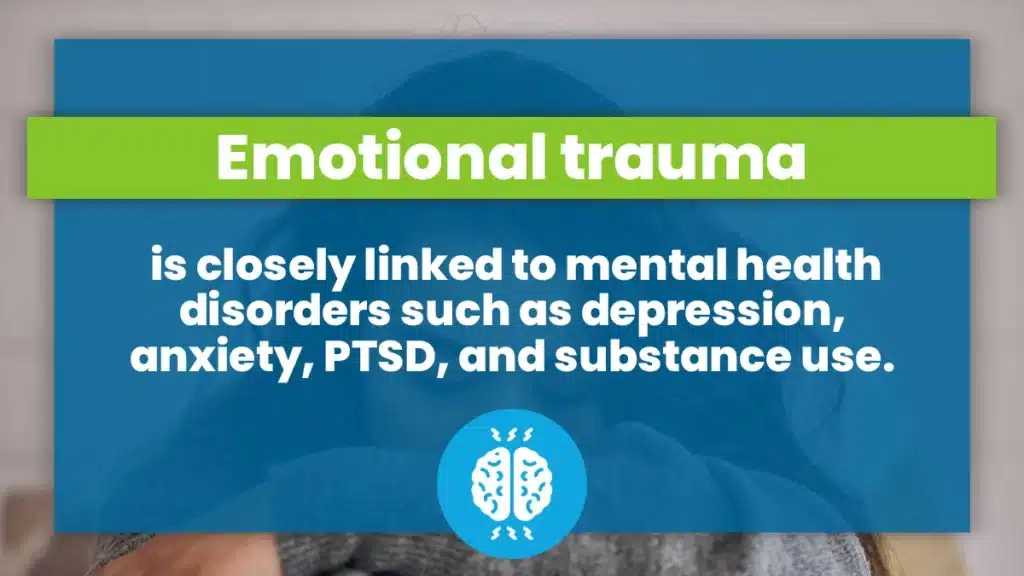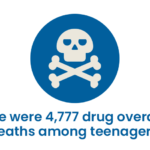Emotional trauma in adults refers to the lasting emotional response to a distressing or traumatic event that overwhelms one’s ability to cope. These experiences, such as abuse, loss, or accidents, can profoundly impact mental and emotional well-being, often leading to various adverse effects on the quality of daily life.
This article delves into recognizing signs of emotional trauma in adults. These signs manifest in different ways physically, psychologically, and socially. By understanding these indicators, individuals and their support networks can better recognize and address the effects of emotional trauma, promoting recovery.
Key Takeaways
Emotional trauma can deeply impact adults, affecting their mental and emotional well-being. Here is what this article covers:
- Emotional trauma is like an internal wound that disrupts thoughts and feelings, often stemming from distressing events.
- Various physical, emotional, behavioral, and social signs can indicate underlying emotional trauma in adults.
- Emotional trauma is closely linked to mental health disorders such as depression, anxiety, PTSD, and substance use.
- Recovery from emotional trauma involves counseling and therapy, medications, support groups, and healthy lifestyle changes.
Contact The Haven Detox-South Florida at (561) 328-8627 for comprehensive care and emotional support for mental health concerns.
Understanding Trauma
Trauma is a person’s psychological and emotional response to an event or experience that is deeply distressing or disturbing. It overwhelms a person’s ability to cope, leaving lasting effects on their mental, emotional, and sometimes physical well-being.
Traumatic experiences can range from a variety of situations, such as accidents, natural disasters, sexual abuse, violence, or other threatening events. There are different types of trauma:
Acute Trauma: This results from a single stressful or dangerous event, such as a car accident, sexual assault, terrorist attack, or plane crash.
Chronic Trauma: This stems from prolonged, repeated exposure to highly stressful events, such as ongoing abuse or living in a war zone.
Complex Trauma: This is the result of exposure to multiple traumatic experiences, often occurring early in life, such as childhood abuse or neglect. It can have profound and long-lasting effects.
Remember, not everyone who goes through a traumatic event will develop long-term difficulties. Factors like individual resilience, the presence of a strong support system, and timely access to professional help can significantly influence how a person copes with and recovers from trauma.
Identifying Emotional Trauma: Signs To Look For
Emotional trauma can manifest in various ways, affecting individuals physically, mentally, emotionally, socially, and behaviorally. Here are some common signs of emotional trauma:
Physical Signs
Emotional trauma can manifest in the form of a variety of physical symptoms, affecting the body’s well-being and functionality.
- Insomnia or Nightmares: Difficulty sleeping or recurring nightmares can indicate the presence of emotional distress.
- Fatigue and Exhaustion: Constantly feeling drained, even without physical exertion, can be a sign of emotional trauma.
- Physical Pain: Unexplained bodily aches, pains, or tension, particularly in areas like the neck, shoulders, or back, can be linked to unresolved emotional trauma.
- Changes in Appetite: Significant changes in appetite, either eating significantly more or less than usual, can be a physical sign of emotional distress.
- Weakened Immune System: Chronic stress from emotional trauma can weaken the immune system, leading to increased susceptibility to illnesses.
Mental and Emotional Signs
The impact of emotional trauma goes beyond physical manifestations, deeply affecting an individual’s mental and emotional state.
- Flashbacks or Intrusive Thoughts: Recurrent, distressing memories of the traumatic event or intrusive thoughts can have a profound impact on mental well-being.
- Anxiety and Panic Attacks: Heightened anxiety, panic attacks, or an increased sense of fear and worry are common emotional responses to trauma.
- Depression and Feelings of Hopelessness: Emotional trauma can contribute to feelings of sadness, despair, and a persistent sense of hopelessness.
- Emotional Numbness or Detachment: Some individuals may feel emotionally numb or detached from their surroundings as a way to deal with the overwhelming emotions associated with trauma.
- Mood Swings: Fluctuations in mood, ranging from irritability and anger to sudden bouts of sadness, can indicate unresolved trauma.
Social and Behavioral Signs
Trauma’s effects extend into the social and behavioral spheres, influencing how individuals interact, connect, and behave within their environments and relationships.
- Withdrawal and Isolation: A person dealing with emotional trauma might withdraw from friends, family members, and social activities, preferring to be alone.
- Avoidance Behaviors: Avoiding places, people, or situations that remind them of the traumatic event is common.
- Substance Abuse: Some individuals might turn to alcohol, drugs, or other addictive substances as a way to cope with the emotional pain caused by trauma.
- Difficulty Trusting Others: Trust issues, skepticism, and difficulty forming or maintaining relationships may arise due to the trauma experienced.
- Aggression or Self-Destructive Behaviors: In some cases, unresolved trauma can lead to aggressive behavior or self-harm as a way to cope with overwhelming emotions.
Remember, these symptoms of trauma can vary in intensity and may not be present in every individual who has experienced trauma. Seeking professional help from licensed mental health professionals, such as a therapist or counselor, can provide tailored support to manage and heal from emotional trauma.
Trauma and Mental Disorders: Understanding the Link

Emotional trauma can significantly impact mental health and is often associated with various mental health disorders. Here’s a breakdown of how trauma can link to specific conditions:
Depression
Emotional trauma can significantly increase the risk of depression. When someone goes through tough experiences that hurt them emotionally, it can leave a lasting mark on their mental health. Feeling sad, hopeless, and losing interest in things they used to enjoy are common signs of depression. Trauma can make these feelings more intense and long-lasting.
Anxiety Disorders
Trauma can also trigger anxiety disorders. People might feel extremely worried or nervous, even without a clear reason. They might constantly feel on edge, have panic attacks, or struggle with fears that disrupt their daily life. Trauma often contributes to these overwhelming feelings of anxiety.
Post-Traumatic Stress Disorder (PTSD)
Post-traumatic stress disorder (PTSD) is a specific mental health condition caused by experiencing or witnessing a traumatic event. It can follow someone long after the event is over, causing flashbacks, nightmares, and intense fear or anxiety. Trauma can deeply affect how the brain processes memories, leading to these ongoing distressing symptoms.
Substance Use Disorders (SUDs)
Sometimes, people with traumatic past experiences turn to substances like drugs or alcohol to cope with the emotional pain caused by trauma. This can lead to substance use disorders (SUDs), where they depend on these substances to feel better. However, it often ends up making things worse, creating more problems for their mental health.
Borderline Personality Disorder (BPD)
Emotional trauma can also be linked to borderline personality disorder (BPD). People with BPD might struggle with their sense of self, have intense and unstable relationships, and experience extreme mood swings. Trauma in their past might contribute to these difficulties in managing emotions and relationships.
Dissociative Disorders
Trauma can lead to dissociation, where someone feels disconnected from themselves or their surroundings. It’s like feeling numb or outside of reality. Dissociative disorders can cause memory lapses, feeling like things aren’t real, or even forgetting important parts of their life.
Understanding the connection between trauma and these mental health conditions is crucial for seeking proper support and treatment. It’s important to remember that with the right help and support, people can work through these challenges and move towards healing.
Reclaiming Wellness: Treatments for Emotional Trauma
When it comes to healing from emotional trauma, various approaches are available that can help individuals find their way back to a sense of well-being and stability.
Counseling and Therapy
Talking with a therapist or counselor can be a key part of healing. These professionals are there to listen and provide guidance, helping individuals understand their feelings and reactions to the trauma. Through different therapies like cognitive behavioral therapy (CBT) or eye movement desensitization and reprocessing (EMDR), people can learn to deal with the effects of trauma and build resilience.
Medications
In some cases, medications can be a helpful part of the treatment plan. Antidepressants or anti-anxiety medications may be prescribed to alleviate symptoms like depression, anxiety, or insomnia. While not a sole solution, medications can complement other therapeutic approaches, providing additional support during the healing process.
Mindfulness and Relaxation Techniques
Practicing mindfulness, meditation, or relaxation techniques can be incredibly helpful. These methods focus on being present at the moment, calming the mind, and reducing stress. They teach individuals how to ground themselves when feelings of distress or anxiety arise, providing a way to cope with difficult emotions.
Support Groups
Being part of a mental health support group allows individuals to connect with others who have gone through similar experiences. Sharing stories, advice, and understanding within a supportive community can make a big difference. It helps people feel less alone and allows them to express themselves without fear of judgment.
Healthy Lifestyle Changes
Taking care of one’s physical health can significantly impact emotional well-being. Regular exercise, eating nutritious foods, and getting enough sleep are essential. Avoiding substances like drugs or alcohol and finding healthy ways to manage stress can also contribute positively to the healing process.
Remember, there is no one-size-fits-all journey; what works for one person might be different for another. However, these treatment options offer a range of tools and support to help individuals navigate their path toward recovery and a renewed sense of hope.
Frequently Asked Questions
How do you know if you’re emotionally traumatized?
You might be emotionally traumatized if you experience persistent feelings of fear, sadness, or anger without a clear reason. Trouble sleeping, feeling detached from others, or finding it hard to handle everyday tasks could also indicate emotional trauma. Seeking support can help.
What does coming out of trauma feel like?
Recovery from trauma might feel like a weight lifting off shoulders, finding peace, feeling safer, and rediscovering joy in simple things. It’s a gradual journey marked by moments of clarity, hope, and learning to live with newfound strength.
How does your body register trauma?
Trauma registers in the body with physical signs like headaches, stomachaches, or tiredness. It might disrupt sleep, cause changes in appetite, and lead to muscle tension. These signals reflect the mind’s distress, affecting how the body feels and functions.
What are the symptoms of emotional damage in adults?
Emotional damage in adults can show as persistent sadness, anxiety, or sudden mood changes. It might lead to difficulty trusting others, feeling disconnected, or engaging in risky behaviors. Recognizing these signs is crucial for seeking help and healing from emotional wounds.
Revitalize Your Life With The Haven Detox-South Florida
In the journey towards healing from trauma, know that you are not alone. At The Haven Detox-South Florida, we understand the challenges and believe recovery is achievable.
Our facility offers a compassionate and safe environment for mental health treatment. With our residential rehab programs, you’ll receive personalized therapy, medication management, and round-the-clock care. Our evidence-based methods aim to restore and enhance mental well-being, empowering you to recover.
Don’t wait to take the first step. Contact us at (561) 328-8627 today. Let’s work together to get you the support and guidance you deserve.








